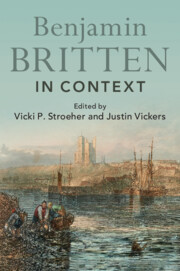Book contents
- Benjamin Britten in Context
- Composers in Context
- Benjamin Britten in Context
- Copyright page
- Dedication
- Contents
- Figures
- Tables
- Notes on Contributors
- Acknowledgements
- Bibliographic and In-Text Abbreviations
- Prologue
- Part I The Britten Circle(s)
- Part II British Musical Life
- Part III Britten and Other Composers
- Part IV Wordsmiths, Designers, and Performers
- Chapter 24 W. H. Auden
- Chapter 25 Eric Crozier
- Chapter 26 Two Librettists
- Chapter 27 The Wise, Queer Heart of Englishness
- Chapter 28 William Plomer’s Poetics of Exile at Home
- Chapter 29 ‘Don’t Colour Them, the Music Will Do That’
- Chapter 30 Designing and Dancing Britten
- Chapter 31 Pears as Illuminator, Interpreter, and Inspiration
- Chapter 32 Britten’s Singers
- Chapter 33 Britten’s Performers: Those Most ‘Instrumental’
- Part V British Sociocultural, Religious, and Political Life
- Further Reading
- Index
Chapter 25 - Eric Crozier
from Part IV - Wordsmiths, Designers, and Performers
Published online by Cambridge University Press: 31 March 2022
- Benjamin Britten in Context
- Composers in Context
- Benjamin Britten in Context
- Copyright page
- Dedication
- Contents
- Figures
- Tables
- Notes on Contributors
- Acknowledgements
- Bibliographic and In-Text Abbreviations
- Prologue
- Part I The Britten Circle(s)
- Part II British Musical Life
- Part III Britten and Other Composers
- Part IV Wordsmiths, Designers, and Performers
- Chapter 24 W. H. Auden
- Chapter 25 Eric Crozier
- Chapter 26 Two Librettists
- Chapter 27 The Wise, Queer Heart of Englishness
- Chapter 28 William Plomer’s Poetics of Exile at Home
- Chapter 29 ‘Don’t Colour Them, the Music Will Do That’
- Chapter 30 Designing and Dancing Britten
- Chapter 31 Pears as Illuminator, Interpreter, and Inspiration
- Chapter 32 Britten’s Singers
- Chapter 33 Britten’s Performers: Those Most ‘Instrumental’
- Part V British Sociocultural, Religious, and Political Life
- Further Reading
- Index
Summary
From mid-1943 until late-1950, Eric Crozier was an essential asset to Britten’s industry. His work alongside director and radio producer Tyrone Guthrie not only introduced Crozier to the Old Vic in London, but to the BBC as well, where Guthrie also worked. Joan Cross invited Crozier and Guthrie to each direct two different productions at Sadler’s Wells in 1943. Crozier directed and produced Britten’s first two operas, Peter Grimes in 1945 at Sadler’s Wells, and The Rape of Lucretia in 1946 for the short-lived Glyndebourne English Opera Company. Crozier wrote the librettos for Albert Herring and the children’s entertainment Let’s Make an Opera (with its central opera, The Little Sweep), in addition to writing the text for the cantata Saint Nicolas, and with E. M. Forster, he was co-librettist for Billy Budd. Britten, Crozier, and designer John Piper founded the English Opera Group. The endeavour was based on ‘the Britten–Crozier doctrine’ that sought the group’s own autonomy and ultimately a home to produce such works. That home was largely realised in the founding of the Aldeburgh Festival of Music and the Arts in 1948, for which Crozier was a founder and co-artistic director.
Keywords
- Type
- Chapter
- Information
- Benjamin Britten in Context , pp. 223 - 231Publisher: Cambridge University PressPrint publication year: 2022

